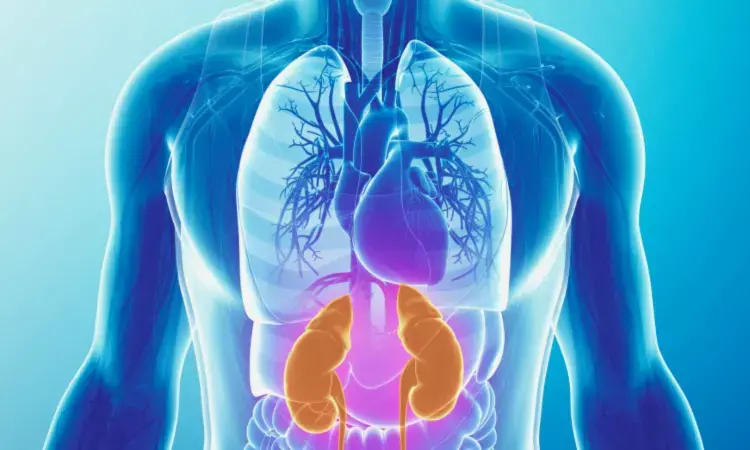- Home
- Medical news & Guidelines
- Anesthesiology
- Cardiology and CTVS
- Critical Care
- Dentistry
- Dermatology
- Diabetes and Endocrinology
- ENT
- Gastroenterology
- Medicine
- Nephrology
- Neurology
- Obstretics-Gynaecology
- Oncology
- Ophthalmology
- Orthopaedics
- Pediatrics-Neonatology
- Psychiatry
- Pulmonology
- Radiology
- Surgery
- Urology
- Laboratory Medicine
- Diet
- Nursing
- Paramedical
- Physiotherapy
- Health news
- Fact Check
- Bone Health Fact Check
- Brain Health Fact Check
- Cancer Related Fact Check
- Child Care Fact Check
- Dental and oral health fact check
- Diabetes and metabolic health fact check
- Diet and Nutrition Fact Check
- Eye and ENT Care Fact Check
- Fitness fact check
- Gut health fact check
- Heart health fact check
- Kidney health fact check
- Medical education fact check
- Men's health fact check
- Respiratory fact check
- Skin and hair care fact check
- Vaccine and Immunization fact check
- Women's health fact check
- AYUSH
- State News
- Andaman and Nicobar Islands
- Andhra Pradesh
- Arunachal Pradesh
- Assam
- Bihar
- Chandigarh
- Chattisgarh
- Dadra and Nagar Haveli
- Daman and Diu
- Delhi
- Goa
- Gujarat
- Haryana
- Himachal Pradesh
- Jammu & Kashmir
- Jharkhand
- Karnataka
- Kerala
- Ladakh
- Lakshadweep
- Madhya Pradesh
- Maharashtra
- Manipur
- Meghalaya
- Mizoram
- Nagaland
- Odisha
- Puducherry
- Punjab
- Rajasthan
- Sikkim
- Tamil Nadu
- Telangana
- Tripura
- Uttar Pradesh
- Uttrakhand
- West Bengal
- Medical Education
- Industry
Curcumin may Mitigate BEP-Induced Kidney Toxicity, reveals study

Researchers have found in a new study that curcumin offers renal protection against BEP chemotherapy-induced toxicity by reducing oxidative stress, inflammation, and cell death, suggesting its potential as a therapeutic option for managing BEP-related kidney complications.
Bleomycin, etoposide, and platinum (BEP) are among the most commonly used and effective anticancer medications in oncology clinics.
The study’s objective was to examine the efficacy of curcumin and curcumin-cyclodextrin (nanocurcumin) as protective agents against BEP nephrotoxicity. Renal toxicity was evaluated through various parameters, such as histopathology and serum urea and creatinine levels. In addition, the levels of Nitric Oxide (NO) and total antioxidant capacity (TAC) and the expression of the Tumor Necrosis Factor-alpha (TNF-α) and caspase 3 genes were investigated.
These experiments were performed on Wistar rats, which were divided into six groups: control, BEP, curcumin, nanocurcumin, curcumin + BEP, and nanocurcumin + BEP. Results: The findings of the present study revealed that the administration of curcumin and nanocurcumin improved the blood urea and creatinine levels and improved kidney histology in rats treated with BEP. In addition, curcumin and nanocurcumin strengthened the antioxidant status in the kidney by increasing TAC and decreasing NO levels.
Therefore, alterations in the gene expression of TNF-α and caspase3 showed that curcumin could modulate and regulate the process of apoptosis and inflammation caused by BEP. These results showed that curcumin protects kidneys from BEP-induced toxicity by reducing oxidative stress, cell death, and inflammation, and it can be considered a possible option to improve renal complications caused by the BEP chemotherapy regimen.
Reference:
Bartani, Z., Nemati, H., Heshmati, S. et al. The protective effect of curcumin nanoparticles on renal damage caused by a combination of bleomycin, etoposide, and cisplatin. BMC Nephrol 26, 354 (2025). https://doi.org/10.1186/s12882-025-04286-x
Dr. Shravani Dali has completed her BDS from Pravara institute of medical sciences, loni. Following which she extensively worked in the healthcare sector for 2+ years. She has been actively involved in writing blogs in field of health and wellness. Currently she is pursuing her Masters of public health-health administration from Tata institute of social sciences. She can be contacted at editorial@medicaldialogues.in.
Dr Kamal Kant Kohli-MBBS, DTCD- a chest specialist with more than 30 years of practice and a flair for writing clinical articles, Dr Kamal Kant Kohli joined Medical Dialogues as a Chief Editor of Medical News. Besides writing articles, as an editor, he proofreads and verifies all the medical content published on Medical Dialogues including those coming from journals, studies,medical conferences,guidelines etc. Email: drkohli@medicaldialogues.in. Contact no. 011-43720751


